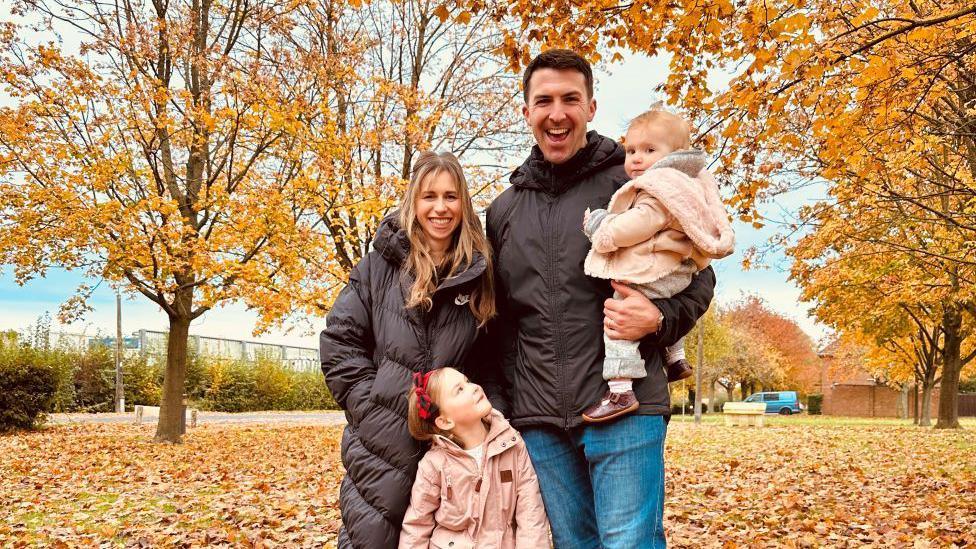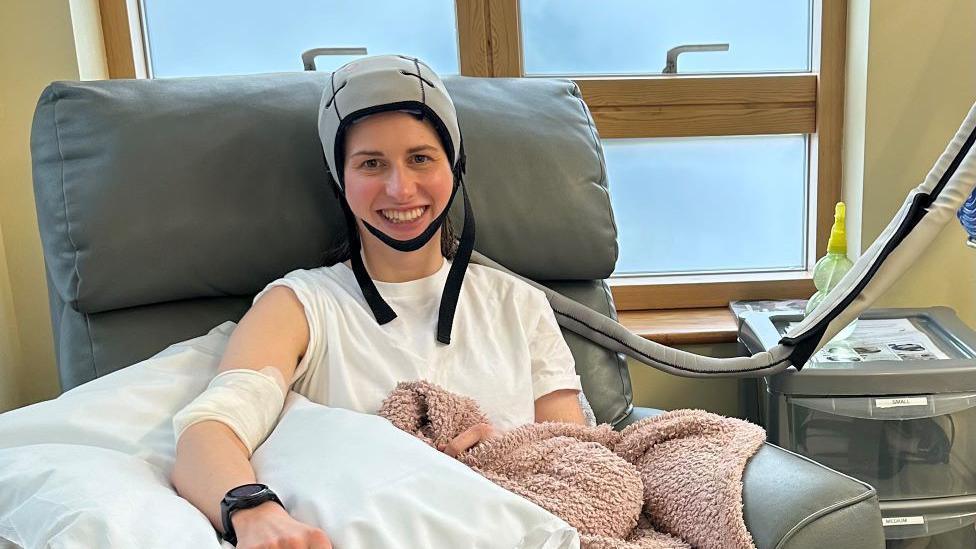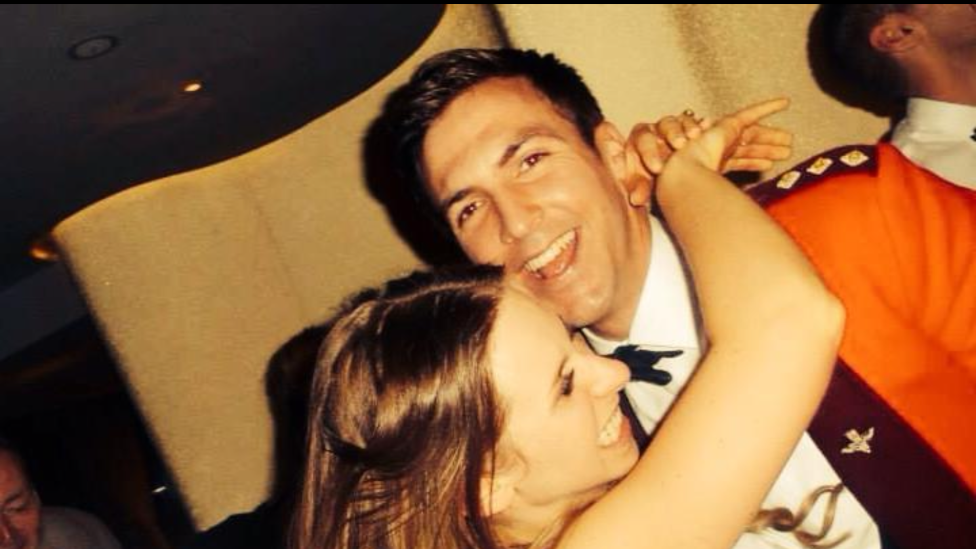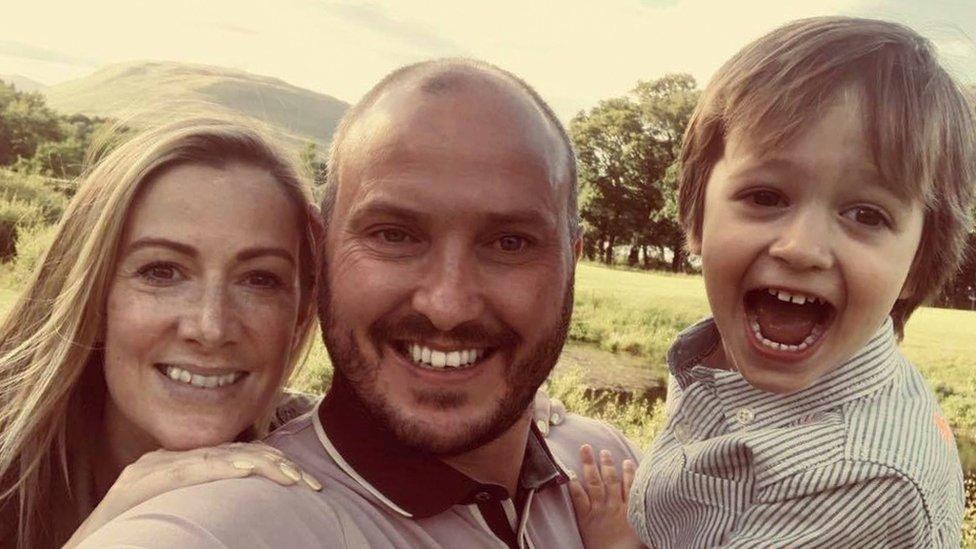'I felt selfish struggling when my wife had cancer'

Lucy and Tom Fitton's lives was turned upside down when she was diagnosed with breast cancer last year
- Published
When his wife was diagnosed with cancer Tom Fitton felt he had to be a "pillar of strength" for his family and felt selfish struggling with his own mental health while his wife was ill. One year on, he wants to use his experience in the hope it will encourage other men to open up.
When his wife Lucy, 35, was diagnosed with stage three breast cancer in October 2023, Mr Fitton, 35, felt he had to be strong for her and their two children aged one and four.
The Apache helicopter pilot from the Army's Wattisham airbase in Suffolk started a journal to chronicle his feelings which he has now turned into a book which he hopes will help others.
"It's OK not to be OK, but it's not OK not to do anything about it," he said.
Mrs Fitton first felt a lump while breastfeeding the couple's youngest daughter.
Initially it was diagnosed as a cyst in 2022, but a year later she returned to the doctor and asked for a referral to the breast clinic.
Within weeks she was diagnosed with breast cancer and the family's world turned upside down.
Her husband said: "I felt like I didn't really have anyone to talk to about it who could relate... I didn't know any other young dads going through the same thing.
"It felt so abnormal - an overwhelming feeling of isolation."

Lucy Fitton was diagnosed after spotting a lump while breast feeding
Focusing on his wife and two daughters, he said he found it hard to talk about his feelings and accept help.
He also said he did not want to talk about his problems, which he felt were small in comparison to his wife's.
"You feel you don't want to be selfish, you feel selfish if you feel like you're having a hard time, you think 'but I'm healthy, I'm absolutely fine'," he said.
Mr Fitton said he also had "a lot of internal anger" after the diagnosis which he started to write down as a way to cope.
"I didn't want that to come out in conversation with Lucy or with other family and friends," he said.
He added there would be "little frustrations" that he would normally speak to his wife about, but he felt them build up as he tried not to bother her with his problems.
"I avoided conversations with her, not wanting to be selfish , so there's that element, not wanting to give her stress," he added.
"The problem is you don't want to share problems, but it's still going on in your mind."
Being a "pillar of strength for the family" he found it hard to be vulnerable.
"It isn't an easy conversation for a man to have," he said.
"But the more you talk about it and the more you talk to people, you get good advice back.
"You get told 'of course it's normal, of course you reacted like that', but every time you internalise, the pressure just builds and builds, it makes it harder, it amplifies it.
"Being able to talk to someone about it makes a big difference."
Eventually he realised he needed to open up about his mental health to be the partner and father he wanted to be.
"What I realised was that for me to be able to support them... you can't look after everyone else for any significant amount of time if you're not looking after yourself."

Mr Fitton said he realised he needed to look after his own mental health to be strong for his family
As a military man he was encouraged to keep journals while away to help process and remember situations.
"You use a journal and it's really good for venting, it's quite good for doing really 'heat of the moment' stuff and it's kind of the screaming in your head. You jot it down and you don't need to scream at anyone else," he said.
Eventually he decided to turn his journal entries into a book, Dad's Diary, which he hopes will raise awareness about men's mental health and raise funds for charity.
Mr Fitton, who has been on desk duties since his wife's diagnosis, said: "I don't want to sound like a cliche but if it helps one person, it's done its job."
"Thankfully not many young families go through this and this is the book I wish had been available to me," he added.
Get in touch
Do you have a story suggestion for Suffolk?
Follow Suffolk news on BBC Sounds, Facebook, external, Instagram, external and X, external.
Related topics
- Published14 November 2018

- Published18 November 2024
